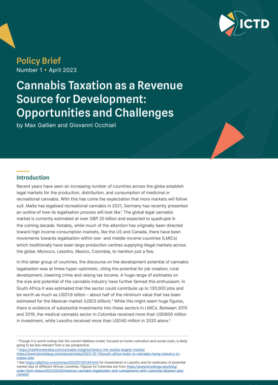Policy Brief 1
Recent years have seen an increasing number of countries across the globe establish legal markets for the production, distribution, and consumption of medicinal or recreational cannabis. With this has come the expectation that more markets will follow suit. The global legal cannabis market is currently estimated at over GBP 20 billion and expected to quadruple in the coming decade.
Notably, while much of the attention has originally been directed toward high income consumption markets, like the US and Canada, there have been movements towards legalisation within low- and middle-income countries (LMICs) which traditionally have been large production centres supplying illegal markets across the globe: Morocco, Lesotho, Mexico, Colombia, to mention just a few. In this latter group of countries, the discourse on the development potential of cannabis legalisation was at times hyper-optimistic, citing the potential for job creation, rural development, lowering crime and raising tax income.
A huge range of estimates on the size and potential of the cannabis industry have further fanned this enthusiasm. In South Africa it was estimated that the sector could contribute up to 130,000 jobs and be worth as much as USD1.6 billion – about half of the minimum value that has been estimated for the Mexican market (USD3 billion). While this might seem huge figures, there is evidence of substantial investments into these sectors in LMICs. Between 2015 and 2019, the medical cannabis sector in Colombia received more than USD600 million in investment, while Lesotho received more than USD40 million in 2020 alone.
And yet, these discussions can appear jarring, as they exist against a backdrop of the still widespread criminalisation of cannabis across much of the global south: glossy brochures on development and cannabis coexist with mass incarceration of consumers and vulnerable producers and distributors. What has been particularly notable, however, is that the policy discussion on legalisation in LMICs is accompanied by a relative scarcity of independent research.
This is especially striking with respect to taxation. Taxes stand at the heart of many of the more optimistic accounts of what LMICs stand to gain from legalising. This is intuitive, as they can both be a crucial element of market building and generate substantial revenues – revenue from cannabis excises taxes represented more than 1.5% of total state tax revenue in Colorado, Nevada and Washington5. And yet, there is almost no research or policy discussion on the reality of cannabis taxation in LMICs. To the degree that they exist, discussions are focused around the practices adopted in the US and Canada, without reference to the specificities of LMICs, both with respect to tax administration and their global position in cannabis value chains. Interestingly, even in LMICs in which there are currently conversations around legalisation and some draft legislation is published, plans on taxation are almost entirely absent from public debate – Mexico, Morocco and Malawi all provide examples here.
The goal of this policy brief is to provide a framework for thinking about cannabis taxation in LMIC contexts – to outline the opportunities and trade-offs involved. Our focus here is not to provide definite policy prescriptions, but analogies and considerations that can structure and inform these discussions, which we think are overdue. We do this based on secondary literature and interviews with cannabis experts and policy makers in LMICs as well as by drawing on wider experiences of tax policy and administration in LMICs. At the centre of this brief is the idea that cannabis taxation in LMICs needs an approach that is different from the US, Canada or Germany due to the specificities of LMICs’ contexts. This includes a variety of factors, such as differences in state capacity to implement complex market design projects, the different fiscal treatment of existing small-scale farming, the context of cannabis production in many LMICs which includes both long-standing small-scale agricultural producers and incoming export-oriented producers, as well as the potential role of FDI in local market development.
We argue that what is required in designing cannabis tax policies in LMICs is not the adaptation of high-income countries (HICs) best practices but rather holistic thinking about the role of taxes in market creation that is specific to local contexts and looks beyond cannabis taxation as a simple sin tax issue. In this paper, we highlight four considerations in particular that can structure such discussions: formalisation,
industrial policy, equity and capacity. We argue that, based on previous experience with goods that share some features with cannabis, the more optimistic discourse on the developmental and fiscal upsides of legalisation is likely over-inflated, especially with respect to the impact on small producers. Benefits, fiscal or developmental, will not come automatically, but be dependent on careful and inclusive market and tax design.
